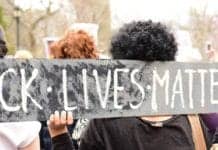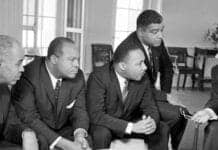by Congresswoman Barbara Lee
I want to thank Congressman Richie Torres and the Congressional Black Caucus for organizing this event to mark 100 years since the horrific tragedy of the Tulsa Greenwood Massacre. In one of the worst acts of racist violence in United States history, a white mob ransacked a prosperous African American neighborhood in Tulsa, Okla., known as Black Wall Street.
From May 31 to June 1, 1921, an estimated 300 Black men, women and children were murdered. The mob destroyed 35 square blocks of Greenwood and burned down over 1,000 Black-owned businesses, churches and homes. During a time when lynching African Americans was commonplace, the alleged, mind you, alleged assault of a white woman by a Black man was enough to incite a massacre of unimaginable proportions.

A thriving Black community became the target of animosity and racial hatred by its neighbors. A grand jury placed the blame for the massacre entirely on the Black community. No white person was ever held accountable for these crimes. This is an example, mind you, of the horrors and the experience of living as a Black person in America then and now.
In 1997, the Oklahoma Legislature established a commission to study the Tulsa Race Riots of 1921. It was charged with the responsibility of developing a historical record of the massacre through identifying witnesses and gathering testimony and records. The commission not only corrected the record, but also recommended reparations for the survivors and their descendants. To date, they have not received any, mind you, any direct compensation.

Up until recently, the silence in Tulsa, in Oklahoma and in the United States about this massacre was an intentional effort to whitewash our nation’s racialized past. But we must remember these stories; we must tell the truth about our past.
And I introduced H.Con.Res. 19 to establish a national truth, racial healing and transformation commission to usher in this moment of truth to begin to examine and lift up to the public the historical record of the history and legacy of slavery and how it’s manifested today in systemic racism as it relates to African Americans.
But telling the truth alone is not enough. We must pass H.R. 40, sponsored by Congresswoman Sheila Jackson Lee, and I’m a proud co-sponsor of H.R. 40, which is the commission to study and develop reparation proposals for African Americans to address and repair the material harm done by instances like the Tulsa Greenwood Massacre.
The legacy of the Tulsa Greenwood Massacre continues to impact Black Tulsans today.
And I’m pleased to say that my home state of California is leading the nation in this effort being the first state to pass a law to establish a task force to study and develop reparation proposals. Black Tulsans have still not recovered from the impact of the Tulsa Greenwood massacre.
Decades of discrimination following the massacre prevented the community from rebuilding their economic vitality. Black Tulsans are still over two times more likely to be unemployed than their white counterparts.

And their communities are the least likely to attract businesses and large employers. Policies like redlining and local ordinances have prevented growth. And so, the legacy of the massacre continues to impact Black Tulsans today.
We cannot forget and we cannot let the nation forget about the Tulsa Greenwood Massacre. H.R. 40 is a bill that we need to move forward to begin to repair the damage of the historical facts of the legacy of enslaved Africans brought to this country who quite frankly still have not, in spite of our progress, achieved liberty and justice for all.
Congresswoman Lee is a member of the House Appropriations Committee and chair of the subcommittee on State and Foreign Operations. She serves as co-chair of the Steering and Policy Committee, former chair of the Congressional Black Caucus, chair emeritus of the Progressive Caucus, co-chair of the Congressional Asian Pacific American Caucus Health Task Force and co-chair of the Pro-Choice Caucus. As a member of the House Democratic Leadership, she is the highest ranking African American woman in the U.S. Congress.

 Store
Store












